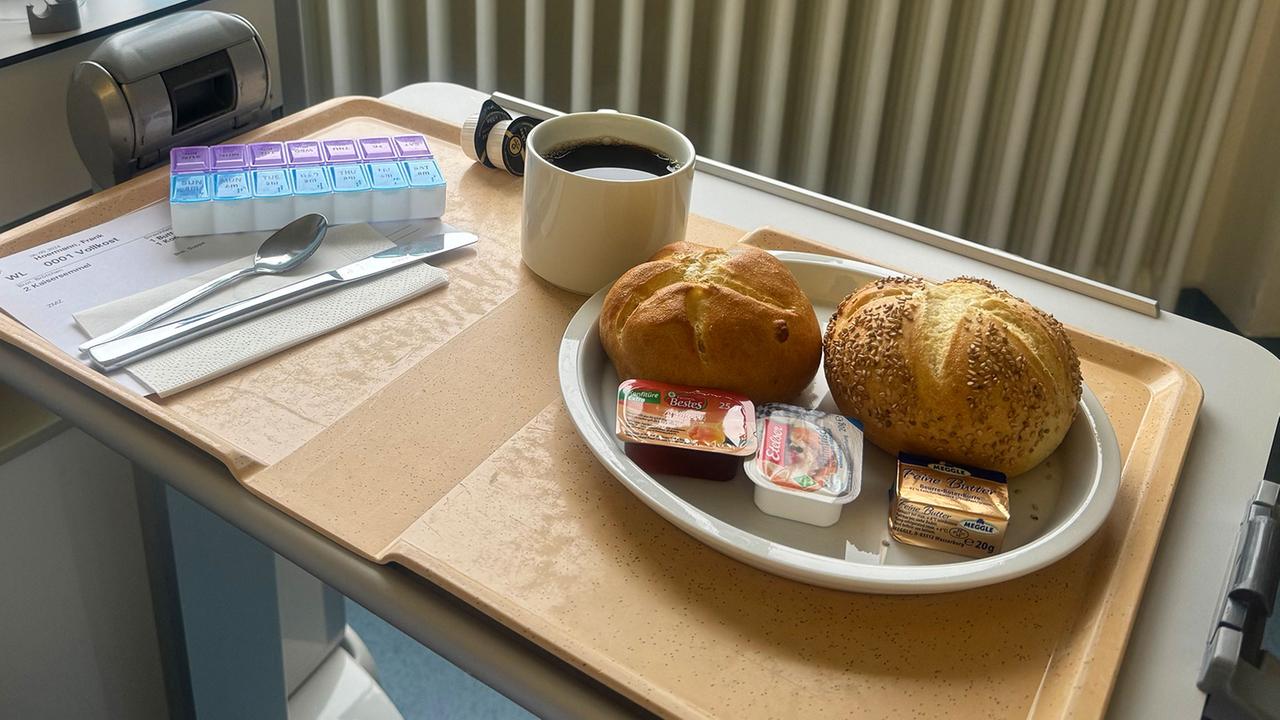A healthy diet is essential in the hospital. But the reality is often different: cheap mass-produced goods, because the clinics have to make very tight calculations.
Eating in the hospital: Almost everyone has had their own experiences with this. Patients are happy to exchange information about the clinic's food. The tastes are different. Some are happy, but many also complain. “An absolute catastrophe. Inhumane,” “Hospital food is stupid,” “It doesn't look really tasty. It wasn't,” are some of the comments on the Internet.
Diana Rubin is chief physician at the Vivantes Clinic in Berlin and is also on the board of the German Society for Nutritional Medicine. The importance of food for the recovery of patients plays a major role: “A healthy and appropriate diet in the hospital is extremely important – regardless of whether operations are being carried out or whether there is cancer.”
This influences the entire healing process. A good diet leads to fewer complications and even deaths.
Six euros per patient per day
On average, clinics spend just six euros per day on a patient's food. The economic situation in the hospitals is really dramatic, says Gerald Gaß from the German Hospital Association: “80 percent are in the red, we have not received any inflation compensation for the enormous increase in material costs, and in the end this also affects the food supply.” The hospitals would like to offer higher quality products, but unfortunately there is no money available for this.
The problem: Clinics usually receive a flat-rate budget per patient for all costs incurred. Nutritional medical services, such as nutritional advice, cannot be billed separately in the German healthcare system, explains chief physician Rubin. Whether you also provide nutritional advice or not doesn't matter when it comes to the proceeds. You don't get paid extra for that.
Risk factor Malnutrition
Around one in four patients comes to the hospital malnourished. Many people continue to lose weight during their stay. There is a risk that they will become permanently bedridden. But that's exactly what you have to recognize first. At the Vivantes Clinic, every patient admitted to the hospital is examined in detail for malnutrition and, if necessary, treated by an entire nutrition team. But only about five percent of clinics do this to this extent.
The so-called effort study from Switzerland provides facts. 2,000 patients with malnutrition were scientifically examined. 1,000 of them received standard hospital food. The other 1,000 received individual nutritional care, with meals containing more calories, protein, vitamins and nutrients. The result: There were significantly fewer complications in the better-nourished patients. In comparison, their risk of dying was 35 percent lower.
50 percent organic food in the Munich clinic
The Isar Clinic in Munich is also fighting against cost pressure. The team has been working on an optimization concept for ten years. The motto: save money where you can, but not on healthy eating. The clinic now offers 50 percent organic food. She also buys food cheaply that would normally not even be sold for aesthetic reasons but would instead be thrown away.
Andreas Wolf, who looks after the finances at the clinic, sees this as a win-win situation: “On the one hand, it is a measure against food waste, but also a way in which we can provide patients and employees with healthy, pollutant-free food here to the clinic without having any economic disadvantages.”
Savings are also made in other areas. Many products, such as bandages, are delivered bundled. This saves expensive rent for a central warehouse. Money that could then flow into healthy food.
Fight against Food waste
A special food ordering app is also linked to numerous departments in the house, including bed planning and directly to the kitchen. The app recognizes when a patient has a procedure, whether they need to fast, when they will be admitted and also when they will leave the clinic. No food stays or goes back.
“As a result of the measures taken to combat food waste, we have to buy fewer goods overall on the procurement side. We have to produce fewer dishes that are not ultimately needed. We also end up having to dispose of less than leftover food,” says Wolf. This saves the clinic a smaller six-figure amount.
Nevertheless, it would also help at the Isar Clinic if there was a subsidy for meals. Here too, efforts must be made to maintain the current level of supply and investments must also be made, says Wolf.
Open letter to ministers
Numerous doctors from various clinics wrote an open letter to Federal Food Minister Cem Özdemir (Alliance 90/The Greens) and Federal Health Minister Karl Lauterbach (SPD) in 2022 and asked for an adequate budget for meals. But so far nothing has arrived in the clinics.
“The appropriate use of the respective resources, e.g. in the area of appropriate quality catering (…), is to be decided by the hospitals on their own responsibility,” said the Ministry of Health Plus minus with. Hospitals that want to pay more attention to the well-being of their patients will continue to bear the costs themselves. There is no separate budget.
“It has to be said that the Federal Minister of Health and the federal government as a whole are not only ignoring the economic situation of hospitals, but are clearly consciously accepting it,” complains Gerald Gaß from the German Hospital Association. He expects politicians to be more willing: “If the situation is as it is now, in which we have been let down for years and the hospitals are underfunded, then no one can expect the hospitals to be able to meet higher standards. “




